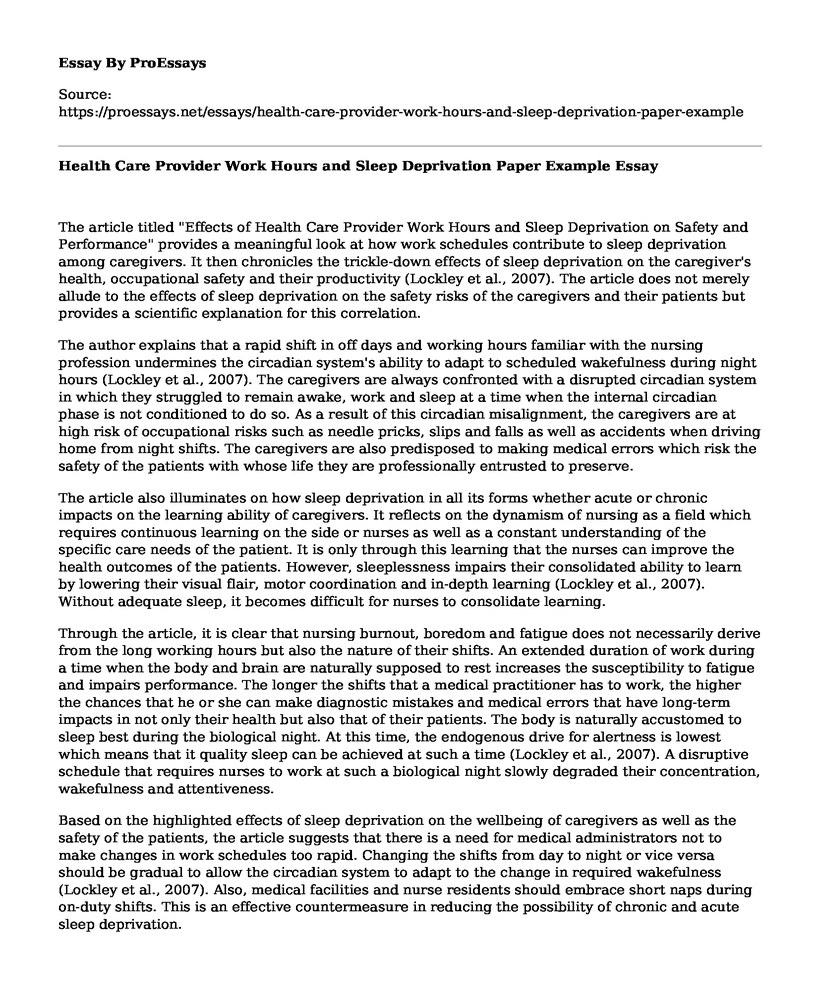The article titled "Effects of Health Care Provider Work Hours and Sleep Deprivation on Safety and Performance" provides a meaningful look at how work schedules contribute to sleep deprivation among caregivers. It then chronicles the trickle-down effects of sleep deprivation on the caregiver's health, occupational safety and their productivity (Lockley et al., 2007). The article does not merely allude to the effects of sleep deprivation on the safety risks of the caregivers and their patients but provides a scientific explanation for this correlation.
The author explains that a rapid shift in off days and working hours familiar with the nursing profession undermines the circadian system's ability to adapt to scheduled wakefulness during night hours (Lockley et al., 2007). The caregivers are always confronted with a disrupted circadian system in which they struggled to remain awake, work and sleep at a time when the internal circadian phase is not conditioned to do so. As a result of this circadian misalignment, the caregivers are at high risk of occupational risks such as needle pricks, slips and falls as well as accidents when driving home from night shifts. The caregivers are also predisposed to making medical errors which risk the safety of the patients with whose life they are professionally entrusted to preserve.
The article also illuminates on how sleep deprivation in all its forms whether acute or chronic impacts on the learning ability of caregivers. It reflects on the dynamism of nursing as a field which requires continuous learning on the side or nurses as well as a constant understanding of the specific care needs of the patient. It is only through this learning that the nurses can improve the health outcomes of the patients. However, sleeplessness impairs their consolidated ability to learn by lowering their visual flair, motor coordination and in-depth learning (Lockley et al., 2007). Without adequate sleep, it becomes difficult for nurses to consolidate learning.
Through the article, it is clear that nursing burnout, boredom and fatigue does not necessarily derive from the long working hours but also the nature of their shifts. An extended duration of work during a time when the body and brain are naturally supposed to rest increases the susceptibility to fatigue and impairs performance. The longer the shifts that a medical practitioner has to work, the higher the chances that he or she can make diagnostic mistakes and medical errors that have long-term impacts in not only their health but also that of their patients. The body is naturally accustomed to sleep best during the biological night. At this time, the endogenous drive for alertness is lowest which means that it quality sleep can be achieved at such a time (Lockley et al., 2007). A disruptive schedule that requires nurses to work at such a biological night slowly degraded their concentration, wakefulness and attentiveness.
Based on the highlighted effects of sleep deprivation on the wellbeing of caregivers as well as the safety of the patients, the article suggests that there is a need for medical administrators not to make changes in work schedules too rapid. Changing the shifts from day to night or vice versa should be gradual to allow the circadian system to adapt to the change in required wakefulness (Lockley et al., 2007). Also, medical facilities and nurse residents should embrace short naps during on-duty shifts. This is an effective countermeasure in reducing the possibility of chronic and acute sleep deprivation.
I have experienced the effect of having an inadequate sleep due to the high level of commitment at work. During one incident, I worked overtime and arrived home very late. Due to the fact that I still had to report on duty the next day, I had no otherwise but to turn up to work though I had an insufficient sleep the night before. I experienced fatigue and general body weakness. At first, I ignored it but realized I could hardly concentrate on my work and made several simple errors. I had the perception that working hard means sleeping late and waking up early but then I had to retreat to my desk and slept for more than two hours before I regained activity. It was embarrassing to sleep during work time but the inadequate sleep I had the previous night could not allow me to work without at least some rest.
Reference
Lockley, S. W., Barger, L. K., Ayas, N. T., Rothschild, J. M., Czeisler, C. A., & Landrigan, C. P. (2007). Effects of health care provider work hours and sleep deprivation on safety and performance. The Joint Commission Journal on Quality and Patient Safety, 33(11), 7-18.
Cite this page
Health Care Provider Work Hours and Sleep Deprivation Paper Example. (2022, Oct 06). Retrieved from https://proessays.net/essays/health-care-provider-work-hours-and-sleep-deprivation-paper-example
If you are the original author of this essay and no longer wish to have it published on the ProEssays website, please click below to request its removal:
- Importance of Mycoplasma Detection in the Biopharmaceutical Industry
- Nursing Meta-Paradigms Paper Example
- Essay Sample on Myasthenia Gravis: A Chronic Autoimmune Neuromuscular Disease
- Essay Example on Social Location: Impact on a Social Worker in Stamford Hill
- Essay on Psychosocial Factors & Patient Education: Impact on Health
- Essay Sample on Sickle Cell Disease: Unveiling the Genetic Factor and Health Disparities
- Evidence-Based Practice: Validated Sources for Nurses' Skills & Knowledge - Essay Sample







